|
|
|
Sort Order |
|
|
|
Items / Page
|
|
|
|
|
|
|
| Srl | Item |
| 1 |
ID:
144167
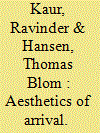

|
|
|
|
|
| Summary/Abstract |
India’s celebrated ‘arrival on the global stage’ as a desirable ‘emerging market’ for global investors signals the spectacular moment that is said to have ruptured the barriers between the first and third worlds. If the notion of arrival anticipates the long-awaited acceleration in the pace of history, it also harnesses a euphoric India to the limitless future promised by the new. In this special issue, we set our focus on the aesthetics of arrival that signal novelty, visibility and celebration of post-reform India within and outside the nation. We ask how novelty is manufactured and experienced when the majority of the population remains excluded from new India. The answer probably lies in the way in which this other India is signified as the past, as ‘old India’ that holds back the nation. The novelty, we propose, is not only experienced in the promise of the future, but also in the aesthetic force of the promise to overcome a humiliating past, tainted by colonialism, in order to realise a truer and more timeless ‘new’ India
|
|
|
|
|
|
|
|
|
|
|
|
|
|
|
|
| 2 |
ID:
144173
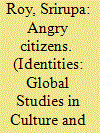

|
|
|
|
|
| Summary/Abstract |
This article examines the emergence of the angry citizen as a legitimate political actor in post-colonial Indian democracy. Approaching such ‘civic anger’ as a historically constituted and socio-politically embedded formation rather than as a subjectively and individually experienced feeling, I show that the rise of the angry citizen was linked to the consolidation of a distinctive politics of curative democracy in the ‘long 1970s’. The lineages of the civic anger of twenty-first century India may be traced to this older formation of curative democracy. The point here is not to offer a chronological revision of the origins of ‘new India’, but to consider the generalisable political implications of the idea of curative democracy, and to identify the distinctive forms of political agency that are associated with the call to cure, reform or renew democracy.
|
|
|
|
|
|
|
|
|
|
|
|
|
|
|
|
| 3 |
ID:
144172
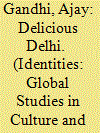

|
|
|
|
|
| Summary/Abstract |
This article examines how Old Delhi is represented and recreated in contemporary India. Delhi’s old city was once the locus of pre-colonial Mughal sovereignty. It is now often encountered via nationalist spectacles, mass-media images and consumption practices. Paralleling neo-liberalism’s onset in the 1990s, its street food, bazaar spaces and historical monuments have been avidly appropriated by reigning institutions and classes. Old Delhi suggests that which the new India has left behind; yet this displacement also elicits longing for what has been lost.
This medieval remnant can therefore be considered the site of nostalgia consumed by a globalised middle class. This article presents an ethnography of Old Delhi’s invocation in New Delhi’s cultural landscape, including malls, newspapers, heritage sites, hotels, and food courts. In triangulating among the realms of nationalist nostalgia, middle-class identity and mediated consumption, it emphasises how India’s neoliberal emergence is bound up with the co-opting of the past.
|
|
|
|
|
|
|
|
|
|
|
|
|
|
|
|
| 4 |
ID:
144170
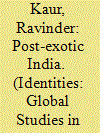

|
|
|
|
|
| Summary/Abstract |
This paper examines the aesthetics of remixing history at the heart of the neoliberal project of India’s image makeover as the ‘land of limitless opportunity’ for global tourists and investors. I argue that the project of remixing India’s history is predicated upon the ontological fault line of how to retain and erase the original simultaneously while shaping the new in the contemporary global. Taking the Incredible India campaign as an example, I show how the original essence of India is revealed and authenticated in the very moment of its disappearance as it is morphed in the aesthetics of the contemporary global. The post-exotic self, I further argue, is not produced by effacing the exotic past, but by condensing, accelerating and fast-forwarding it into a timeless, infinite global present. And in doing so, it also reveals the blueprint of the ongoing visual rearrangement of nation’s civilisational past in the making of new India.
|
|
|
|
|
|
|
|
|
|
|
|
|
|
|
|
| 5 |
ID:
144171


|
|
|
|
|
| Summary/Abstract |
India’s post-liberalisation landscape has unexpectedly been populated by monumental iconic statues. These statues, co-emergent with an automobile and construction boom and an attendant resignification and revaluing of land, are a productive site for rethinking the role of spectacle in neoliberal globalisation from the locus of post-liberalisation India. Against theories that characterise spectacle as primarily virtual and deterritorialised, they illuminate how spectacle is enmeshed in the imaginaries, spatial politics, material processes and heterogeneous temporalities of uneven development. Their religious aspect also calls for a re-examination of Benjamin’s distinction between cult value and exhibition value.
|
|
|
|
|
|
|
|
|
|
|
|
|
|
|
|
| 6 |
ID:
144168


|
|
|
|
|
| Summary/Abstract |
When, in 1947, India became independent, its archetypal citizen-subject was the farmer; 60 years later it was the software engineer. Increasingly central, rather than marginal, in global economic networks, India’s popular image at the beginning of the twenty-first century is of a postcolonial nation that has successfully used technology to leapfrog over its historical legacy of underdevelopment. This shift in ideal citizen archetypes, from farmer to digital entrepreneur, has brought with it new assumptions about the role of information technology in shaping citizenly behaviour and nationalist subjectivity. This paper reads the contradictory aesthetics of this arrival by interrogating popular technological tropes.
|
|
|
|
|
|
|
|
|
|
|
|
|
|
|
|
| 7 |
ID:
144169
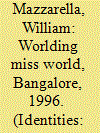

|
|
|
|
|
| Summary/Abstract |
This essay revisits the much-discussed swarm of protests surrounding the 1996 Miss World pageant in Bangalore, India. It suggests that behind the clamour of clashing opinions regarding the content of the pageant lay a deeper crisis, uninterrogated yet constantly palpable: the absence of a performative dispensation within which the then-nascent project of liberalisation could, paradoxically, be experienced as self-grounding. By organising its discussion around interviews with some of the people most directly involved in trying to manage the meaning of the event – through sponsorship, public relations, policing, and protest – the essay shows how a reconsideration of the pageant can help us understand the delicate relation between commercial publicity and sovereign authority in a globalising age.
|
|
|
|
|
|
|
|
|
|
|
|
|
|
|
|
|
|
|
|
|